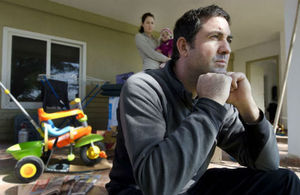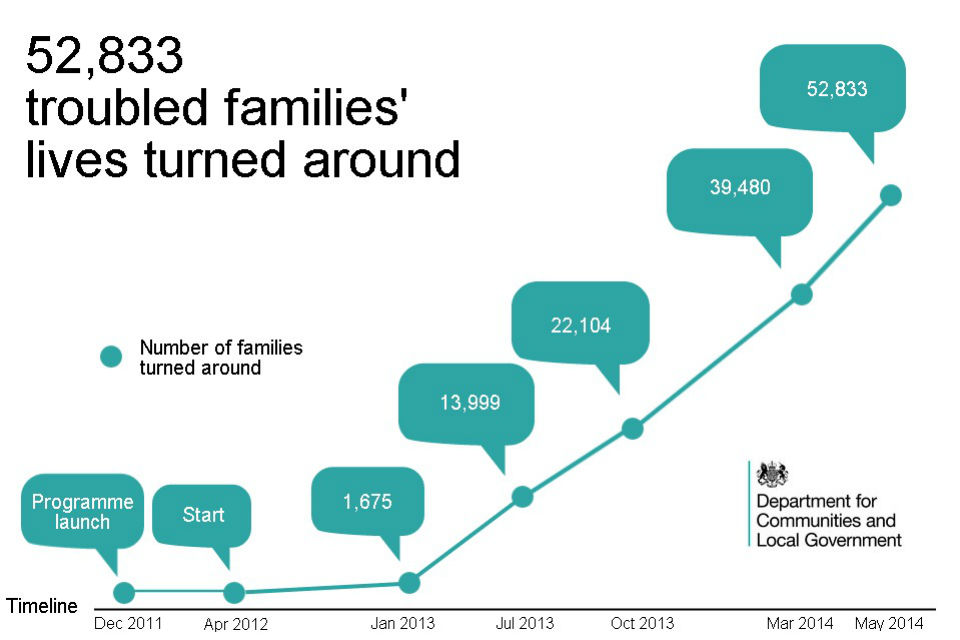53,000 troubled families' lives turned around
Councils have been praised for turning around the lives of almost 53,000 troubled families in little over 2 years.

Speaking at the Local Government Association annual conference in Bournemouth today (9 July 2014), Communities Secretary Eric Pickles announced that 52,833 of the most troubled families in England had been put back on track by local authority teams since April 2012.
This means that:
- children are back in school for 3 consecutive terms where they were previously truant or excluded
- high levels of youth crime and anti-social behaviour have been significantly reduced
- and/or adults that were on benefits have been in work for at least 3 months
High-performing areas include Wakefield, which has turned around 925 out of its 930 troubled families; Leicestershire, which has turned around 772 out of 810; and Bristol, which has turned around 1,158 out of 1,355.
The Secretary of State said that councils all over England had risen to the challenge of helping whole families improve their lives, through a ‘tough love’ approach that combines intensive and practical support.
Eric Pickles said:
To have helped so many families so quickly is testament to the hard work and determination of troubled families teams across the country.
Nobody is saying that troubled families will become model citizens overnight but turning them around starts with getting kids off the streets and into school, giving them a better chance in life, and helping adults into employment or better able to work.
This is good for the taxpayer, good for the families themselves and good for the communities around them.
Troubled Families programme timeline showing progress since launch to May 2014

Further information
The Troubled Families programme applies to England only.
Troubled families are defined as those who:
- are involved in youth crime or anti-social behaviour
- have children who are excluded from school or regularly truanting
- have an adult on out-of-work benefits
- cost the public sector large sums in responding to their problems, an estimated average of £75,000 per year without intervention
Turning around troubled families means:
- getting children back into school
- cutting youth crime and anti-social behaviour across the whole family
- getting adults into work
- reducing the costs to the taxpayer of tackling their problems
See full details of the government’s payment by results framework for troubled families.
The figures from local authorities on progress within the government’s Troubled Families programme have been collated from the latest quarterly returns submitted to DCLG’s Troubled Families team from all 152 upper tier local authorities in England in May 2014. These do not constitute official statistics.
Local authorities are paid up to £4,000 on a payment-by-results basis for turning around troubled families. The government’s £448 million 3-year budget for 2012 to 2015 is drawn from 6 Whitehall departments who all stand to benefit from the public sector working more effectively with troubled families.
At the Spending Review last year it was announced that the Troubled Families programme would be expanded to work with more families. The Budget in March 2014 announced that work with up to 40,000 of these families would begin this year.
Office address and general enquiries
2 Marsham Street
London
SW1P 4DF
Email [email protected]
General enquiries: please use this number if you are a member of the public 030 3444 0000
If your enquiry is related to COVID-19 please check our guidance page first before you contact us - https://www.gov.uk/guidance/coronavirus-covid-19-guidance-for-local-government.
If you still need to contact us please use the contact form above to get in touch, because of coronavirus (COVID-19). If you send it by post it will not receive a reply within normal timescale.
Media enquiries
Email [email protected]
Please use this number if you are a journalist wishing to speak to Press Office 0303 444 1209